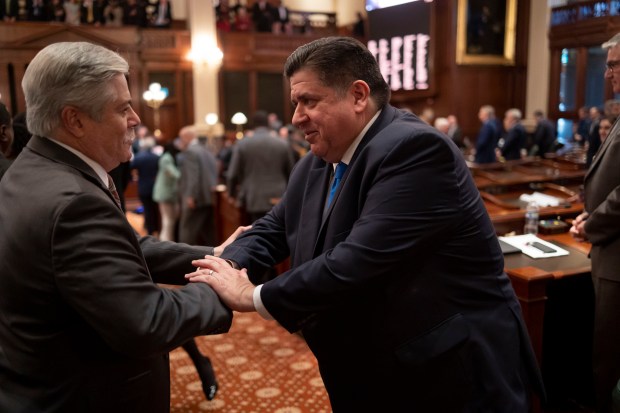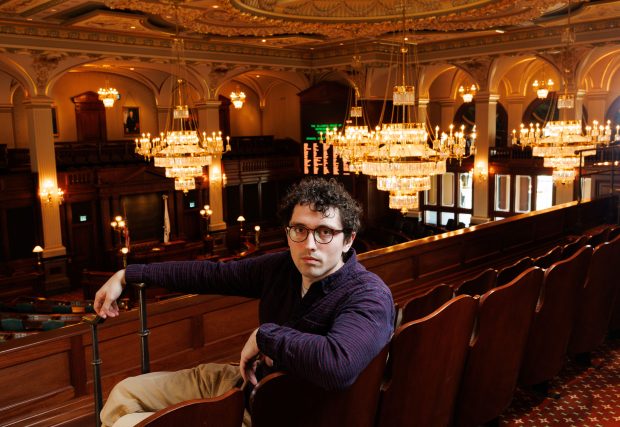SPRINGFIELD — A veteran Illinois lawmaker was ousted from his committee chairmanship post after apparently angering House Democratic leadership by working on a budget plan separately from his caucus during the final weeks of the spring legislative session, according to a Crespo staff member and legislative sources.
State Rep. Fred Crespo, a Democrat from Hoffman Estates, was removed on Wednesday from his position as head of the House General Services Appropriations Committee, which considers budget requests for the state’s constitutional offices, according to Crespo’s office and legislative sources. A state representative since 2007, Crespo is a fiscally conservative Democrat who voted against last year’s budget, which included about $750 million in tax hikes.
Crespo was also stripped of his position as co-chair of the Legislative Audit Commission and was disinvited from internal House Democratic caucus meetings, sources said. Additionally, Brady Burden, a budget analyst for Crespo told the Tribune he was put on paid administrative leave pending an investigation into his conduct.
Neither Crespo nor a spokesperson for House Speaker Emanuel “Chris” Welch, who controls committee assignments, would comment on the situation.
The moves under Welch could be seen as another indication of the difficulty Democrats face in crafting a final spending plan before the General Assembly’s scheduled adjournment on May 31. Lowered state revenues and uncertainty about federal funding have made this one of the most challenging budgets in recent years, as lawmakers try to cover a shortfall estimated at about $1 billion.
“This is certainly a tough year, but I will remind you that if you look around the country, every state is facing this challenge right now,” Gov. JB Pritzker said Thursday at an unrelated event. “It’s partly because of the slowdown, the expected slowdown, of the overall economy since the new administration came into office”
Pritzker said Thursday that he had heard about Crespo’s ouster but “I don’t know a lot of the details of why that occurred.”
A source close to Welch, who spoke on a condition of anonymity because they were not authorized to comment on the situation, said every appropriation committee was given tasks that included analyzing and identifying their budgetary priorities, but that Crespo had not kept in touch with the House’s chief budget negotiator. The source said Crespo was the only appropriations committee chair to not complete these tasks.
The source also said Crespo was trying to put together a budget without collaboration from his Democratic colleagues.
Burden defended Crespo’s efforts to craft a budget plan separate from that of House Democratic leadership. “He has valid concerns and he’s trying to provide solutions,” Burden said.
Burden said he alerted the appropriate staffers about what the lawmaker was doing. “There was no secrecy to the fact that he had been expressing interest in doing that,” he said.
Crespo was spurred to work on his own spending plan, which among other things called for the state to withhold some funds that could be restored if revenue estimates brighten, by the threat of reduced federal funding under Trump, Burden said.
Burden has previously run afoul of Welch. In 2023, he led an effort for him and about 20 other House staffers to be recognized as a union. Under pressure from that effort, Welch introduced and pushed through legislation in the House to allow General Assembly employees to be unionized but the bill never made it through the Senate.
Burden and other staffers later sued Welch, alleging he deprived them of their rights to organize as a union. That suit is pending.
Lawmakers have until a scheduled May 31 adjournment to pass a budget, although that deadline is not absolute. Pritzker in February introduced a $55.2 billion budget that kept spending flat in many areas and cut some programs favored by the governor, including healthcare insurance for immigrants under 65.
But an April report from the legislature’s Commission on Government Forecasting and Accountability projected that state revenue growth fell $471 million short of the figure Pritzker used in his proposal. And this week, Pritzker’s budget office projected that revenues were short of more than $500 million compared to the revenue figures in the governor’s February plan.
Testifying about projected revenue before a House committee early Thursday, Alexis Sturm, who heads the Governor’s Office of Management and Budget, said the office has had to deal with uncertainty at the federal level as it has made its recent revenue projections.
“Every year comes with a new challenge. This year’s challenge that we’ve been struggling to try to assess the impact of is the ongoing and shifting federal landscape that’s currently negatively impacting the national economic outlook,” she said.
The office has not made specific adjustments to the proposed budget from February, she added.
“A lot of the revenues are flattening out, but there’s obviously obligations to fund — pensions and health care costs, those things are increasing — and we did try to do it in a balanced way in the introduced budget. But we are reassessing, obviously, some of the numbers,” Sturm said.

Pritzker’s budget proposed no new taxes. But his plan includes increased tax rates on table games at casinos outside Chicago, putting blackjack and roulette on the higher rate used for slot machines. The proposal also calls for a pause in the final shift of state sales taxes on motor fuel purchases to the state’s road construction fund, as well as an amnesty program for delinquent taxpayers. Together, those three changes would generate an estimated $469 million, the governor’s office has said.
On Thursday, lawmakers and labor interests held a news conference to discuss another budget pressure: A fiscal cliff facing Chicago-area public transit and much needed transit infrastructure and operations improvements. Advocates have been trying to come up with a solution in Springfield to plug a deficit for Chicago-area transit systems estimated at more than $700 million.
State Sen. Ram Villivalam, a Chicago Democrat who is one of the leaders of the transit reform efforts, said conversations on that issue are continuing.
“No matter what, whether it’s health care, public safety, education and other issues, we need to be able to make the case that there are programs and services that will be provided for our residents,” he said. “People want safe, reliable and affordable transit, period.”
Olander reported from Chicago. Tribune reporters Dan Petrella and Addison Wright contributed.



